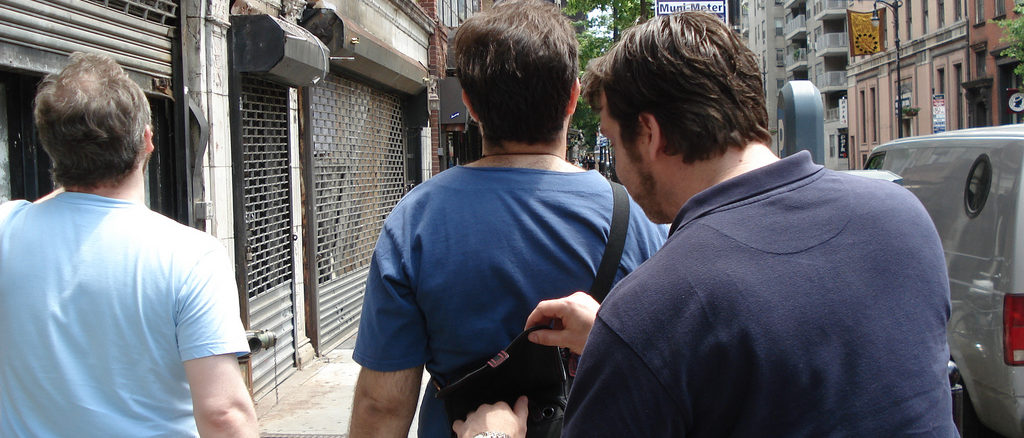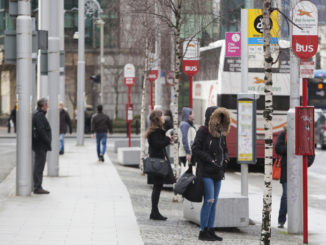
It’s Thursday evening at Abbey St. Luas stop and passengers endure a numbing wind while waiting to board. As the tram pulls up, congestion builds with it.
At the back of the queue waiting to board stands a young girl, wheelie bag in hand, eager to catch her train from Connolly. She checks the time on her phone and places it back in her jacket pocket as she minds her step onto the tram.
The bell sounds and the doors proceed to shut, she looks down to see a hand in her pocket that isn’t hers. Before she has a chance to react the doors close and on the other side stands a man with a new iPhone and a grin.
Many people see the incident but stand helpless as the doors remain closed and the tram pulls off to the despair of this young girl. A couple of seconds was all it took for her to lose the most valuable item in her possession.
With Christmas holidays drawing closer, a higher number of potential victims will be taking to the streets. Many of them will be unwittingly paying Christmas bonuses to the opportunists loitering in our city centre.
A wallet or purse is no longer a top priority for the common pick-pocket. An iPhone 6 can be sold second hand from €450-€600 with similar prices set for a Samsung Galaxy S4 and many other smart phones. These are much easier to snatch than a purse or wallet. A quick glance around any of Dublin’s public transport facilities and you will notice countless phones in hands, on laps and bouncing in and out of pockets with no caution as to who may be observing.
Over 12,000 phones worth an estimated €5 million were reported stolen to Gardaí in 2013 showing a 33 per-cent increase since 2011. The Mirror newspaper also reported that €10,800 worth of phones were snatched in one night by a gang during a gig at Vicar Street on January 27th 2013.
Sgt Alan Rougheen of the National Crime Prevention Unit said that smart phone users need to be more vigilant, particularly as we come into the Christmas season when we are more likely to be out socialising. ‘’All too often we see smart phones worth hundreds of euro being left out on tables in bars, nightclubs, cafés and restaurants while people chat, and this makes it very easy for criminals to simply walk past and steal them. People should also avoid using their phones while walking on the street as it means you are distracted and won’t be able to react to prevent your device being taken from you mid-sentence.”
Tourists are also more vulnerable as their unfamiliarity with new surroundings works against them. The American Embassy reports that around 200 of its citizens’ passports are lost or stolen each year when visiting Dublin.
TV3 documentary ‘Ireland’s Pick Pockets’ illustrates how simply a theft can be executed and highlights tactics used by criminals in order to avoid arrest. The more organised gangs will pass goods on within seconds of taking them in order to be completely free of stolen items, this makes it impossible to arrest them on the spot.
According to the CSO, the amount of reported thefts from a person has risen from 2,691 to 6,521 since 2009. This is a 142% percent increase. The Gardaí have arrested more than 1,100 people throughout the year in separate undercover operations.
Of the 1,100 arrests made, 610 were Romanian while another 100 people were from different countries such Bulgaria and Algeria. The rest were Irish citizens. Senior Garda Officials say there “seems to be no end” to the problem of foreign nationals regularly being brought to their attention.
The spike in Dublin thefts came in sync with London’s hosting of the Olympic Games in summer of 2012. It was originally thought that criminals would travel to London and by the time the games were drawn to a close, many of the opportunists would have moved on to the next event. This has not been the case according to Gardaí Deputy Inspector Michael Cryan.
The talent and expertise shown by the gangs who engage in this activity draw a disturbing conclusion that many more are benefiting greatly without facing any kind of consequence.These and many other arrests have prompted Gardaí to inform the public to take more precautions.
On their website they give many tips on how people can avoid being targeted. They advise you take note of your phone’s unique IMEI number which is found on the back of the phone, or can be retrieved by dialling *#06#.
Although it’s of an uninspiring standard, they also have a recreational video depicting actors and actresses having their phones easily removed from their grasps as ‘’thieves’’ make their getaways at an almost stationary pace. But like the third pair of socks on Christmas day, it’s the thought that counts.
By Gavin O’Callaghan




Leave a Reply